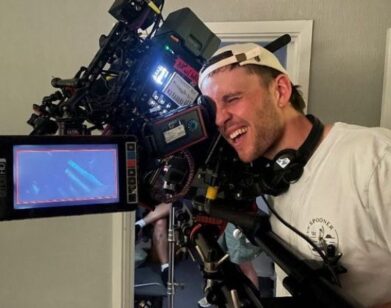Lisa Lewis’ Kind Ambition

ABOVE: LISA LEWIS. PHOTO COURTESY OF DAVID GIBBS
You know what they say about making it in New York. In Lisa Lewis’ new play Schooled, the writer pays homage to this tradition of ambition wielding star-seekers that flock to the city. With a private reading of her sparkling drama at the New Ohio Theatre, starring Tony Award nominee Peter Friedman and a cast of young brilliants including Phoebe Strole, James Kautz, and Mara Davi, it seems the playwright herself has two feet firmly on the ladder of success.
But the scenes here reveal a darker world, where prestige trumps human connection and sexuality is a tool. When a struggling screenwriting student and her wealthy humanitarian boyfriend (who is also dying to break into the movie biz) complete for the same grant bestowed by a prestigious alcoholic professor, boundaries are blurred by booze, breasts, and blind ambition. We spoke with Lewis about the dangers of success, sexuality as a means to an end, why New York brings out the beast in people, and when enough is enough—if it ever is.
ROYAL YOUNG: What is most dangerous about ambition?
LISA LEWIS: Ambition can be really blinding. It also comes with a sense of entitlement. We think we can get ahead and we deserve to, so it allows us to do things we maybe couldn’t justify otherwise. So that’s what’s dangerous about it, but it also allows us to push ourselves and take risks. Success and danger goes hand in hand, right?
YOUNG: For sure. On the flipside, how can it be a positive force that motivates people to strive for more?
LEWIS: We’re all trying to get somewhere. Some people have really clear missions and a really specific goal at the end of their drive. Some people don’t. The people who have really specific goals are the ones who tend to challenge themselves the most. It forces you to dream and make strong choices. For instance, while I was still in school, like 19, I waited backstage for Estelle Parsons with the rough draft of my play from my college workshop. I was totally convinced that she was going to produce it on Broadway. She wrote me this wonderful letter and obviously a rejection along with it, but it was great. I don’t think I would have gotten that if I didn’t have such a clear sense of what I wanted.
YOUNG: As a young, attractive person, is sex sometimes the best way to get ahead?
LEWIS: I think women have a certain advantage and disadvantage. I don’t think sex is the right way to get ahead, but there’s a fine line between flirtation, charm, networking, and seduction. I would never personally use literal sex to get ahead, but I have used my sensuality. And I don’t know that it always works. Sometimes, you feel like you’re getting ahead, but what you’re actually doing is moving into uncomfortable territory that’s not great for your career.
YOUNG: I think that can apply to men, too. Any thoughts on the similarities?
LEWIS: I think being attractive helps. A man who presents himself in a nice suit or well-fitted shirt, all of that telegraphs a person’s competence, but also that you might want to be around that person as well. Whether that’s a sublimated sexual desire, I don’t know, but I think it works in both directions.
YOUNG: So are you saying a certain level of surface presentation is also important?
LEWIS: I do. I hate to say it, but I think it’s fairly obvious. Intelligent, talented people and good, kind, hard workers on all sorts of levels of attractiveness will always be successful. But a clean appearance can help a person along.
YOUNG: What level does hard work get you, and what is that extra something that can push you over the top?
LEWIS: People want to work with other people who are responsible, hardworking, and make them look good. But that extra bit is charm.
YOUNG: How does New York feed into a thirst for power and success?
LEWIS: One of the problems with New York is that we’re constantly surrounded by success in ways that are generally career [oriented]. I think if you asked someone what they did in Colorado, they might say “I like to ski.” In New York, the emphasis is on career. Also, people succeed here in such vivid and visual ways. They’re in magazines, all over the internet, and they also live on your block. We’re constantly in such close proximity to it; if you’re ambitious, it pushes people to strive even harder.
YOUNG: Certainly, and one of the issues I’ve had growing up in New York and doing what I do is that I’ll find myself at a red carpet event, or some awesome open bar, where fancy things are free, but I won’t have enough money to pay my rent.
LEWIS: [laughs] Absolutely! When I worked in film, I would constantly go to screenings. One of them I was sitting next to Robert De Niro and I’m like “Oh my god, I’ve made it. I’m living the dream!” Then I go back to my little shoebox apartment, with my mother screaming at me on the phone. It’s easy to have this gloss on your life, though it’s nothing.
YOUNG: Well, you did read for De Niro at Tribeca, and you’ve written several plays. I’m wondering how ambition has played out in your own life?
LEWIS: I went through different stages. I was determined to come to New York City. Then I went through this lull, like I’m here, isn’t that enough? Then I got older and just realized I had to make something happen, it wasn’t enough.
YOUNG: The tricky thing about ambition is that it’s never enough. You’re only as good as your last triumph.
LEWIS: And there’s always somebody behind you willing to do more. For every line you won’t cross, someone else will.
FOR MORE ON LISA LEWIS, VISIT HER WEBSITE.






